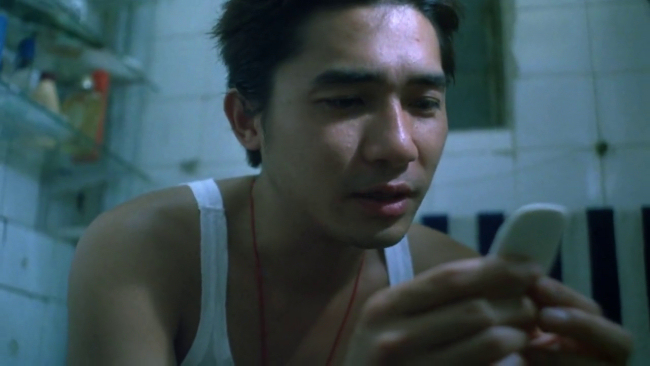
The human need for affection tends to vastly outstrip the pool of affection available, ironically in crowded cities especially, so the human mind tends to compensate with delusion. Wong Kar-wai's 1994 film Chungking Express gives us four people for whom the coping mechanisms for loneliness have grown far more sophisticated than the capacity for connexion. The film's insight into human nature is exquisite and intensely charming.
It employs a wonderfully strange narrative structure. Starting out from the point of view of a cop, 223 (Takeshi Kaneshiro), and a mysterious woman with dealings in the underworld (Brigitte Lin), the film abruptly shifts perspective entirely less than halfway through and becomes about a cafe worker named Faye (Faye Wong) and another cop, 663 (Tony Leung Chiu-Wai).

With the exception of Brigitte Lin's character, all of them are similar in having rituals and routines designed to comfort them, to provide a consistent personality in the absence of the presence of human companionship. 223 has just broken up with his girlfriend named May so he obsessively buys canned pineapple that expires on May 1, telling himself this is truly when his love will expire. 663 talks to inanimate objects in his apartment, finding reasons to speak encouragingly to them, like telling a bar of soap how much weight it's lost since he bought it.

If any one character is more prominent than the others it's Faye. 663 becomes accustomed to seeing her at his favourite snack bar, she obsessively listens to "California Dreamin'" over and over and doesn't seem to take interest in 663 at all. When 663's girlfriend leaves a breakup letter at the snack bar containing spare keys to 663's apartment, Faye steals them and begins secretly living in 663's apartment while he's at work, cleaning the place, stocking his pantry with sardines, and making tiny improvements to the décor.

Faye Wong's performance is so great, so subtle. We have the sense in her few interactions with 663 that she feels a sense of ownership, that he belongs to her, but she doesn't do anything overt to communicate this. She barely even looks at him. The idea of having a real live person in her life is too intimidating, better to live around the edges.

This is the second Wong Kar-wai movie I've seen after In the Mood for Love and I'm again impressed by how much he manages to communicate by not saying anything directly at all. It's a pile of strange behaviour, the human nature implied entirely by the implications of the behaviour is invisible but unmissable.

No comments:
Post a Comment